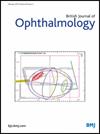Influence of surgeon learning on outcomes in new ophthalmic procedures: quantified nationwide evidence in endothelial corneal transplantation
IF 3.7
2区 医学
Q1 OPHTHALMOLOGY
引用次数: 0
Abstract
Aims To investigate the impact of surgeon learning on endothelial keratoplasty (EK) procedure outcomes. Methods A prospective nationwide registry study of EK grafts in patients aged at least 21 years with Fuchs endothelial corneal dystrophy or pseudophakic bullous keratopathy undergoing a first EK procedure in that eye between 2005 and 2020. EK procedures were either Descemet Stripping Endothelial Keratoplasty (DSEK) or Descemet Membrane Endothelial Keratoplasty (DMEK). Primary outcome was transplant survival at 2 years. Secondary outcomes at 1-year post-transplant were (1) best-corrected visual acuity, (2) requirement for repeat air injection procedures to treat graft detachment and (3) iatrogenic primary graft failure. Results Following analysis of 11 516 EK transplants, significant impact of surgeon learning was indicated by (1) the influence of surgeon prior experience in that EK technique, (2) the influence of surgeon prior experience in postoperative management and (3) the time interval from introduction of that EK technique in the United Kingdom to time of surgery. EK grafts reported to have failed within the first 6 months were a significant proportion of all transplant failures. Conclusions Influence of surgeon learning and inexperience in EK of clinical and statistical significance can be quantified and diminishes over time. Equivalent analyses may be feasible for novel procedures in other ophthalmology specialties and surgical training. Training programmes and nationwide advisory networks may be helpful in reducing the duration and impact of surgeon learning curves. Data are available upon reasonable request.外科医生的学习对眼科新手术结果的影响:全国范围内角膜内皮移植手术的量化证据
目的 研究外科医生的学习对内皮角膜移植术(EK)疗效的影响。方法 对 2005 年至 2020 年期间首次接受 EK 手术的 21 岁以上福氏内皮角膜营养不良症或假性角膜牛皮癣患者的 EK 移植进行全国性前瞻性登记研究。角膜内皮移植手术包括德斯米剥离内皮角膜成形术(DSEK)或德斯米膜内皮角膜成形术(DMEK)。主要结果是移植后 2 年的存活率。移植后 1 年的次要结果是:(1) 最佳矫正视力;(2) 为治疗移植物脱落而重复注射空气的需求;(3) 原发性移植物失败。结果 对 11 516 例 EK 移植手术进行分析后发现,外科医生的学习对以下几个方面有显著影响:(1) 外科医生之前在该 EK 技术方面的经验的影响;(2) 外科医生之前在术后管理方面的经验的影响;(3) 从该 EK 技术在英国引入到手术时间的时间间隔。据报告,在最初 6 个月内失败的 EK 移植占所有移植失败的很大一部分。结论 外科医生在 EK 方面的学习和经验不足对临床和统计意义的影响是可以量化的,并且会随着时间的推移而减弱。对于其他眼科专业的新型手术和手术培训,也可以进行类似的分析。培训计划和全国性咨询网络可能有助于缩短外科医生学习曲线的持续时间并减少其影响。如有合理要求,可提供相关数据。
本文章由计算机程序翻译,如有差异,请以英文原文为准。
求助全文
约1分钟内获得全文
求助全文
来源期刊
CiteScore
10.30
自引率
2.40%
发文量
213
审稿时长
3-6 weeks
期刊介绍:
The British Journal of Ophthalmology (BJO) is an international peer-reviewed journal for ophthalmologists and visual science specialists. BJO publishes clinical investigations, clinical observations, and clinically relevant laboratory investigations related to ophthalmology. It also provides major reviews and also publishes manuscripts covering regional issues in a global context.

 求助内容:
求助内容: 应助结果提醒方式:
应助结果提醒方式:


